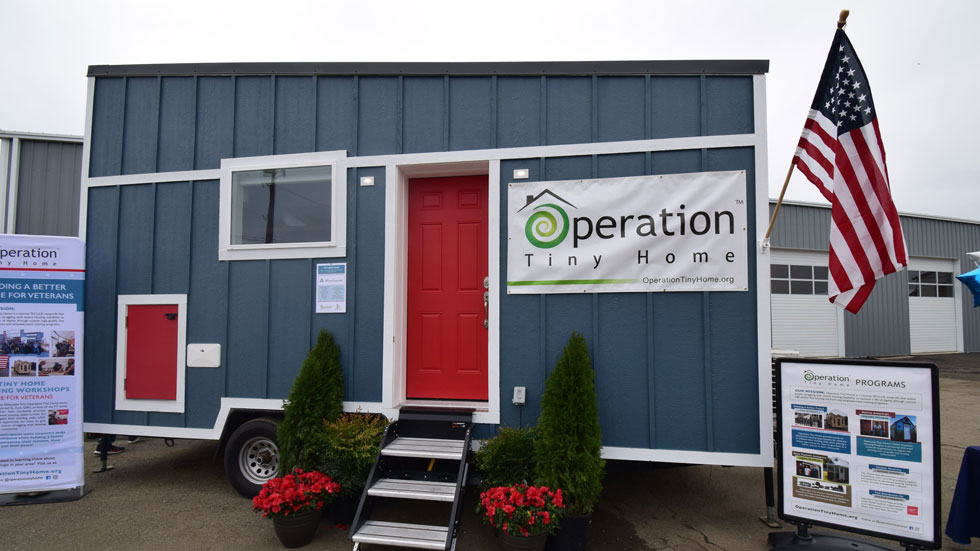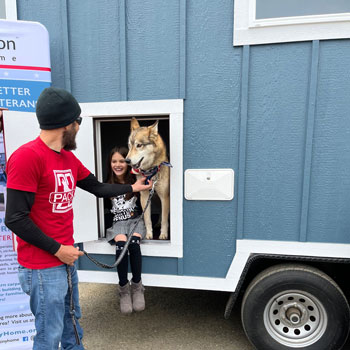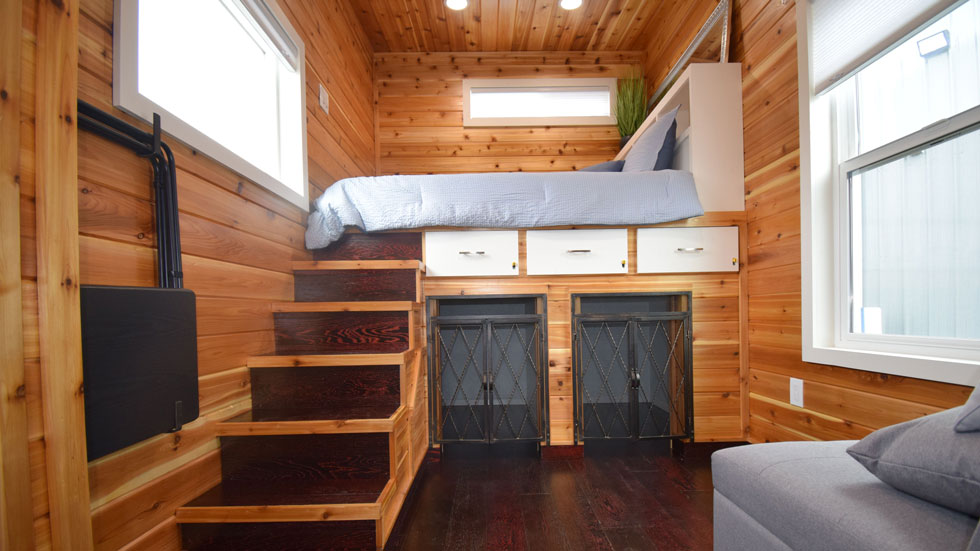Weyerhaeuser's (NYSE:WY) partnership with national non-profit Operation Tiny Home is helping to support the adoption of affordable, innovative, and sustainable housing solutions for military veterans suffering from housing instability and homelessness.
The Seattle-based timberland REIT is also eyeing additional opportunities to work with the nonprofit to help create tiny home solutions for other disadvantaged groups, including those displaced from their homes by natural disasters.
Anne Leyva, who manages Weyerhaeuser’s giving programs, says that supporting Operation Tiny Home aligns with two of three key focus areas in Weyerhaeuser’s new sustainability strategy, which launched in 2020. Those goals, which the company calls its 3 by 30 sustainability ambitions, are: contributing to climate change solutions; helping provide sustainable homes for everyone; and helping its rural operating communities thrive. Weyerhaeuser is committed to making tangible progress in all three areas by 2030.
The connection between Weyerhaeuser and Operation Tiny Home was made about a year ago when the Oregon-based nonprofit contacted the REIT to secure a donation of building materials. When the request came to Leyva’s attention, she was intrigued and looked at the nonprofit in more detail. “I was very pleased to see how well they collaborate with community members, stakeholders, leaders in the community, and nonprofit partners."
Leyva got in touch with Gabrielle Rapport, the founder and executive director of Operation Tiny Home, for more information about how Weyerhaeuser could support the nonprofit’s mission, beyond making an initial lumber donation.
That connection turned into collaboration on a project that Operation Tiny Home had initiated with Mattersville, a nonprofit in Sedalia, Colorado, whose Heroes and Hybrids program is dedicated to rescuing dog and wolf hybrids and pairing them with veterans struggling with PTSD.
Weyerhaeuser stepped in as a project sponsor, providing financial support, while a Weyerhaeuser customer, UFP Industries, Inc., offered product and logistical support to help Operation Tiny Home and Mattersville create the Alpha, a new type of tiny home specifically designed for veterans living with their service animals. About 20 feet long with a few hundred square feet of space, it is unique in that it includes two kennels with doors opening both inside and outside, and an external dog wash area with running water.
Rapport says there are about 1.4 million veterans at risk for homelessness nationwide.
“Coming back and reintegrating into civilian life is something that’s incredibly difficult for many veterans that have been dealing with PTSD and trauma. They are definitely more likely to find themselves coping with problems through medication, alcohol, and drugs, and so they find themselves struggling with housing instability and homelessness.”
To date, Operation Tiny Home has trained over 550 veterans through its workshops that teach basic carpentry skills and tiny home building techniques. Since 2014, the nonprofit has built more than 40 homes. A tiny home may be built on wheels or set on a foundation and is typically 400 square feet or less. They can range from 80 square feet to 750 square feet.
Growing Need
Leyva explains that Weyerhaeuser operates primarily in rural small towns and communities across North America and has a vested interest to ensure the resilience of individuals living in these areas. “They give us the ability to operate, so it’s really imperative that we are a good partner,” she says.
Unfortunately, the need for housing services is growing all the time, she says. “Rural communities are really struggling. It’s not just companies like Weyerhaeuser that have an interest in rural communities, we all do because of what they provide. There’s a real housing gap and it’s becoming deeper and wider,” Leyva says. In response, Weyerhaeuser is “looking at how can we partner better with other organizations, other companies, and community leaders that also are looking to solve the problem."
Leyva acknowledges that “tiny homes aren’t meant for everyone, but they are a great solution for many to get into stable housing and to be a productive member of the community.”
One key group that tiny homes can help, she says, are individuals displaced by natural disasters, including hurricanes, flooding, and fires.
These events “can wear really hard on a community,” Leyva says. She adds that probably every year since she joined Weyerhaeuser 15 years ago there has been a natural disaster that has impacted one or more of its communities. “Tiny homes could be a great solution for those folks that have been displaced by a disaster’s impact, and to keep them in their community.”
Rapport agrees that tiny homes are not a choice that everybody wants, “but for those more aligned with a minimalistic lifestyle and struggling with housing instability, a tiny home provides an affordable option that offers many unique benefits and opens up the future for them.”
Weyerhaeuser’s initial contact with Operation Tiny Home has led to an ongoing dialog, Leyva says, especially since the problem of housing instability and homelessness shows no sign of abating. “We’re looking at ways we can continue to partner with them. I’m not sure what that looks like at the moment—but we’re working on it,” she adds.


